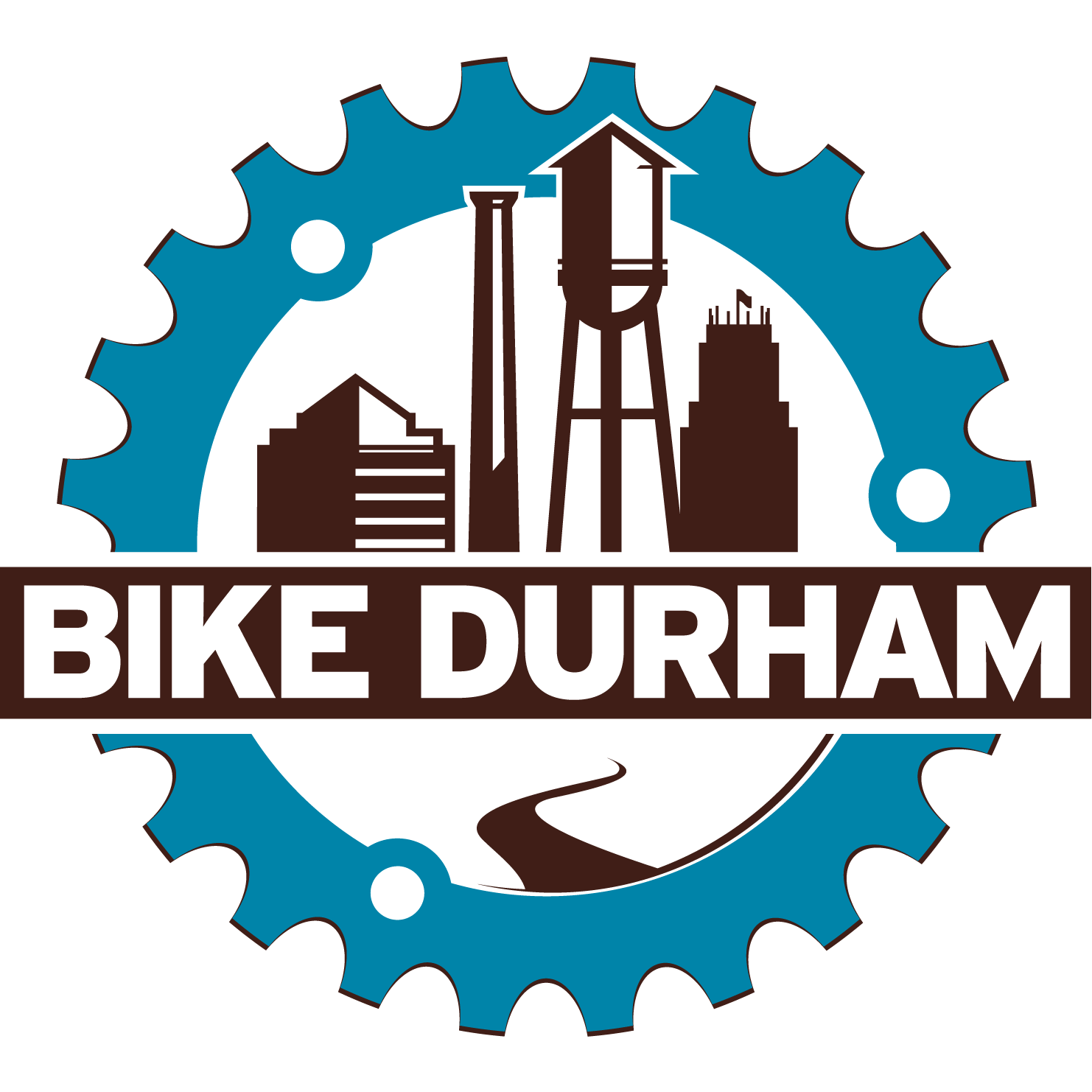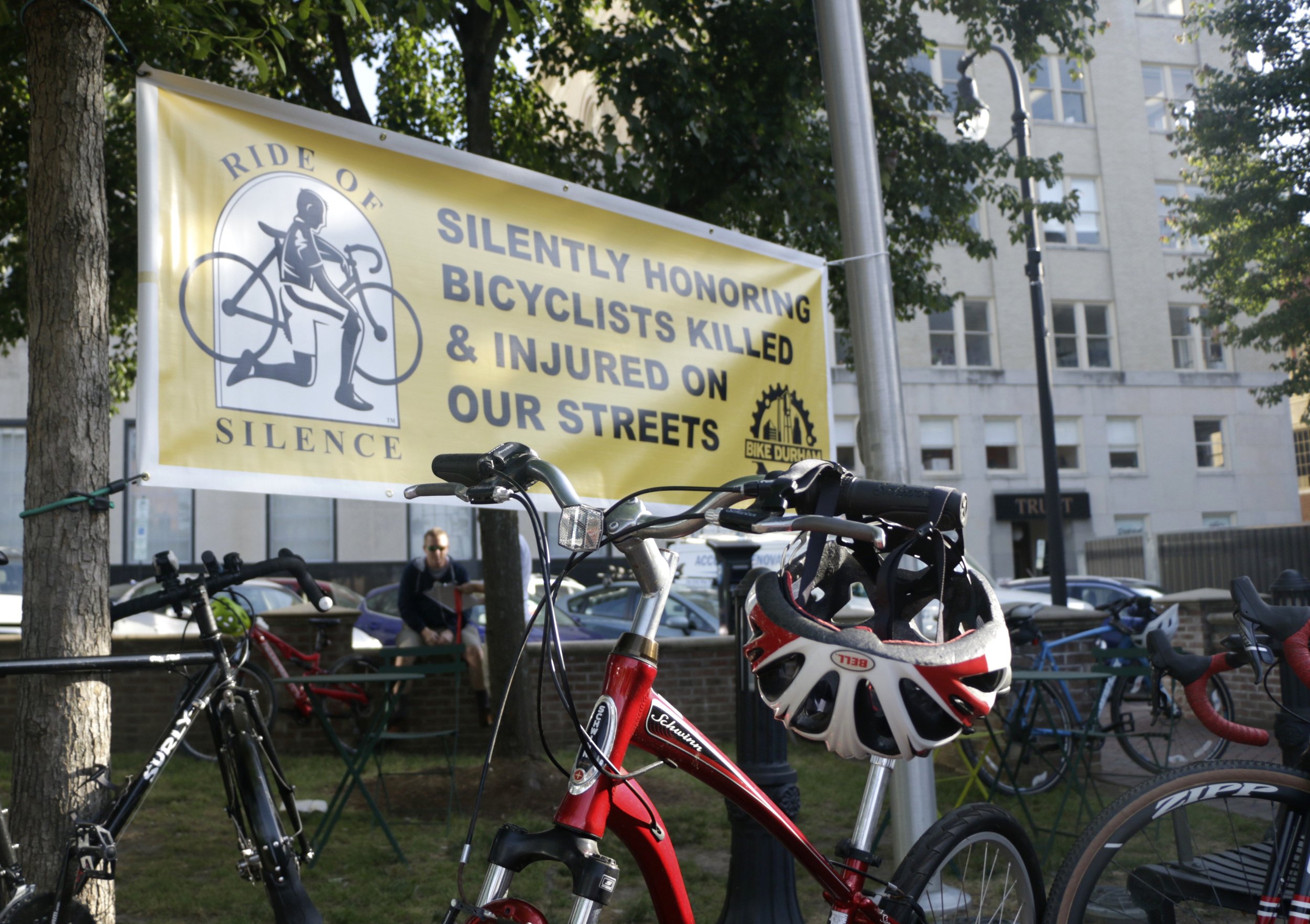Prehistory
2006
The Durham Bike Co-op is founded in the Old Five Points neighborhood. The City of Durham unveils the city’s first bicycle and pedestrian plans, and issues bonds in 2006 and 2008 to partially fund them.
Durham Bicycle Coalition
2009–2010
Copy of poster distributed advertising the organizing meeting for the Durham Bicycle Coalition, precursor to Bike Durham.
Longtime Durhamite Adam Haile is chatting with Rachel Raney, a recent transplant from the San Francisco area, outside the preschool their kids attend, when they see a police officer scold a parent for bringing a child to school in a bicycle trailer. Haile and Raney team with Mark Dessauer, Lisa Miller, and Jack Warman to launch an advocacy group called the Durham Bicycle Coalition. They set up a website, post notices on the Bike-Ped listserv (managed by the City), and leave flyers at the Bike Co-op. Momentum builds when the joint City-County Bicycle and Pedestrian Advisory Committee (BPAC) organizes Bike Month activities with help from the Co-op, which moves to new quarters near the old Durham Athletic Park (the Durham Bulls’ original home) on Morris Street.
2011
The inaugural Tour de Fat bike festival is brought to Durham by New Belgium Brewery (occurs annually through 2016).
2012
Around 70 people attend initial discussions in the Trotter Building on Geer Street to found a new membership-based group, the Durham Bicycle Coalition. Omisade Burney-Scott facilitates. The interim board includes Casey Collins, Adam Haile, Cameron Heath, Branson Kimball, Kevin Magill, Lisa Miller, Rusty Miller, Chris Russo, Carl Sundstrom, Jack Warman, and Debra Campbell West, with Haile and Miller as co-chairs. The East Coast Greenway Alliance acts as fiscal sponsor.
Bike Durham
2013
The name is changed from Durham Bicycle Coalition to Bike Durham. Its mission, bylaws (borrowed from another organization), and 501(c)(3) status are established, and Facebook and Twitter accounts set up. Branson Kimball’s friend Morris Young designs a logo. We join BPAC in planning Bike Month events and we bring bike parking to the Eno River Festival, using BPAC’s bike racks, and bike valet parking to Centerfest. We organize a ride to the movies to see PeeWee’s Big Adventure. A “kidical mass” ride begins Bike Durham’s engagement with children, which will continue with Walk, Bike & Roll to School activities, and, later, Safe Routes to Schools. Seth Vidal, a prominent local bicyclist, is killed while riding on Hillandale Road, galvanizing the community. The nascent organization has 17 members, including 11 founding members.
Original Bike Durham logo in teal and brown designed by Morris Young.
2014
The first working board includes Ryan Asher, Carlo Diy, Kosta Harlan, Bethany Kell, Christin Lampkowski, Harry Mendez Jr., Chris Russo, Rachel Waltz, and Jack Warman. Warman is elected board chair. Bike Durham buys coffee & donuts for City Council, for whom sidewalks become a priority. Investments are made in changes to West Club Boulevard, without consideration for cyclists. Warman presents to Durham Area Transit Authority bus drivers about how to interact with bikes. Bike Durham hosts a bicycle film festival at the Durham Arts Council, a major expense (at the time). The first Bike-a-Bull City event (named by Russo) is held at Bull McCabe’s.
2014–2015
In a six-month span, four Durham cyclists—Pamela Lane, Isidro Razo, Tony Morris Turner, and Kent Winberry—are killed in crashes.
2015
Ride of Silence Banner with event logo and words “Silently honoring bicyclists killed and injured on our streets
In light of recent cyclist deaths, a community meeting draws over 100 people. Bike Durham begins leading the annual “Ride of Silence,” an event that takes place in May throughout the U.S. to mourn killed bicyclists. It gains a lot of volunteers and more of an advocacy focus, and wins an Indy Week “Citizen Award.” NCDOT entertains a potential Durham-Chapel Hill Boulevard road diet, while the City Council is fine with the status quo. Bike Durham reaches out to neighborhood groups, local businesses, and City Council members, gathering more than 1,000 signatures on a petition supporting the road diet. In June, Board Chair Christin Lampkowski live-tweets the City Council meeting where they vote 7-0 in support of the road diet. Bike Durham conducts its first City Council candidate questionnaire. Bike-a-Bull City is held at Ciderworks.
2016
Bike Durham pushes board member Bryan Poole’s hire as a bicycle-oriented planner in Durham’s Transportation Department. He wins the job and steps off the Bike Durham board. Bike-a-Bull City is held at Ponysaurus Brewing. The Durham Bike Co-op moves to Duke Park, where it remains today.
2017
Membership exceeds 60 for the first time. The logo is updated to its current, more colorful design. Former board member Poole, now working for the City, managed the Bike+Walk Implementation Plan, bringing it to City Council adoption in 2017- these are the improvements that the City is still working to complete in 2023. Bike-a-Bull City is held at Durty Bull. Bike Durham begins participating in Durham’s December holiday parade. James Nishimuta is board chair.
2018
Photo and poster design by Toro Town Storyworks.
Membership exceeds 100. Bike Durham pushes for protected bike lanes when Broad Street is resurfaced, but the new design features only painted lanes. The Advocacy Committee devises plans for a citywide Low-Stress Network of connected, protected bike infrastructure. Bike Month Kick-off is held in partnership with Durham’s Bicycle & Pedestrian Advisory Committee (BPAC) at Ponysaurus Brewing. Landis Masnor is board chair.
2019
Membership exceeds 200. Board starts the year adopting a broader mission statement and a commitment to center racial equity. Bryan Poole leaves the Department of Transportation. Bike Durham rents space at the Re:City co-working space for meetings. Masnor leaves Durham, but not before urging board members to hire an executive director to raise capacity to a higher level. Bike-a-Bull City is held at the Scrap Exchange.
2020
Membership rises to 300. Bike Durham hires former GoTriangle leader John Tallmadge as its first executive director, and he goes to work fundraising for an organization that has never had more than a $10,000 bank balance. The COVID-19 pandemic causes an upsurge in bicycling and neighborhood walking, and a drop in transit ridership. Buses go fare-free and introduce rear-door entry to protect drivers; Bike Durham distributes masks at Durham Station. Tallmadge and Erik Landfried launch the Transit Equity Campaign in partnership with the Durham Committee on the Affairs of Black People, People’s Alliance, Durham Congregations in Action, and the Coalition for Affordable Housing & Transit. Allison Shauger is board chair.
2021
Membership approaches 400. We partner with former board member Jen McDuffie submitting a winning proposal to be the program manager for the City’s Safe Routes to School program. Following Jen’s planned departure for Vermont, Jacopo Montobbio and Stephen Mullaney are hired part-time to lead the Safe Routes to School program. We contract with Nikola Milenkovic to work with the Burch Avenue neighborhood and Durham’s Transportation Department on traffic calming. We win adoption of a 2050 long-range transportation plan that removes highway expansion projects toward meeting goals of zero carbon emissions, zero deaths or serious injuries, and zero racial disparity of access. Bike Durham also supports Council adoption of one-half penny property tax dedication to equitable and green infrastructure projects. Move-a-Bull City (rebranded from Bike-a-Bull City to include a pedestrian/transit focus) is held at the Scrap Exchange. Marc Maximov is board chair.
2022
Comparison of traditional approach to traffic safety and the safe systems Vision Zero approach
Bike Durham is named “Advocacy Organization of the Year” by the League of American Bicyclists. An anonymous donor makes a three-year gift that greatly increases the organization’s financial capacity, enabling the Board to hire Tallmadge on a full-time basis, and to create full-time positions for director of development and communications (Nancy Cox) and manager of education programs (Jacopo Montobbio). We contract with Ali Shoenfelt and Nikola Milenkovic to work with Old West Durham and Watts Hospital-Hillandale neighborhoods on traffic calming plans. Matt Simpson, husband and father of two young children, is killed bicycling across Guess Road with his family. In response, we organize a memorial ride and a volunteer Safe Streets Research Team. Post-COVID, monthly community rides and meetings return. Move-a-Bull City is held at Golden Belt. In November, we hold our first event marking the World Day of Remembrance for Road Crash Victims, calling on the City to fund a Vision Zero Coordinator and to adopt a Vision Zero Action Plan within a year. Marc Maximov continues as chair.
2023
We are nearing 500 members/donors. Bike Durham hires Surrayyah Chestnut as Advocacy Campaign Organizer, and two new half-time lead educators (Ashley Scott and Desiree Squire) for the Safe Routes to School program. We organize a successful campaign urging City Council to fund #VisionZeroDurham - including the Vision Zero Coordinator position and $40 million of sidewalk, safe crossings, bicycle facilities, and traffic calming. 10th anniversary activities kicked off at the Museum of Durham History during Bike Month. Shaun King is board chair.






